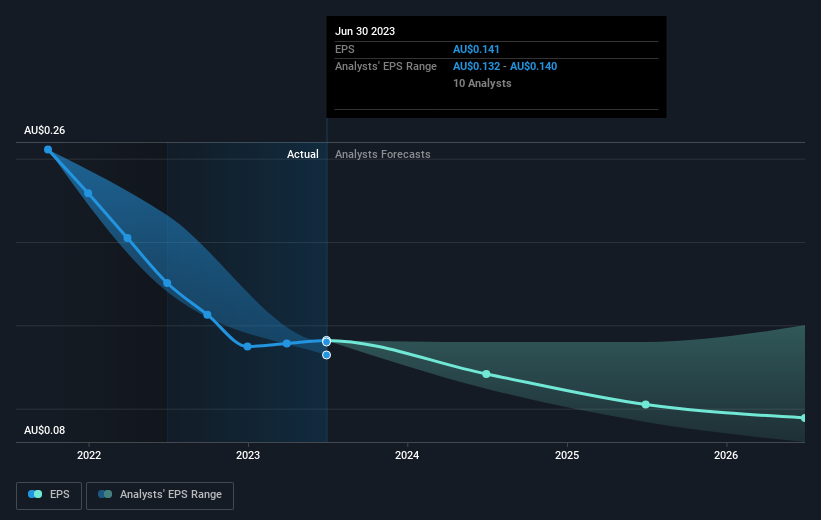The past five years for Platinum Investment Management (ASX:PTM) investors has not been profitable
We think intelligent long term investing is the way to go. But that doesn't mean long term investors can avoid big losses. To wit, the Platinum Investment Management Limited (ASX:PTM) share price managed to fall 76% over five long years. That's an unpleasant experience for long term holders. We also note that the stock has performed poorly over the last year, with the share price down 34%. Shareholders have had an even rougher run lately, with the share price down 28% in the last 90 days.
Now let's have a look at the company's fundamentals, and see if the long term shareholder return has matched the performance of the underlying business.
See our latest analysis for Platinum Investment Management
There is no denying that markets are sometimes efficient, but prices do not always reflect underlying business performance. By comparing earnings per share (EPS) and share price changes over time, we can get a feel for how investor attitudes to a company have morphed over time.
During the five years over which the share price declined, Platinum Investment Management's earnings per share (EPS) dropped by 15% each year. Readers should note that the share price has fallen faster than the EPS, at a rate of 25% per year, over the period. So it seems the market was too confident about the business, in the past. The less favorable sentiment is reflected in its current P/E ratio of 8.34.
You can see how EPS has changed over time in the image below (click on the chart to see the exact values).
This free interactive report on Platinum Investment Management's earnings, revenue and cash flow is a great place to start, if you want to investigate the stock further.
What About Dividends?
When looking at investment returns, it is important to consider the difference between total shareholder return (TSR) and share price return. The TSR incorporates the value of any spin-offs or discounted capital raisings, along with any dividends, based on the assumption that the dividends are reinvested. So for companies that pay a generous dividend, the TSR is often a lot higher than the share price return. In the case of Platinum Investment Management, it has a TSR of -66% for the last 5 years. That exceeds its share price return that we previously mentioned. And there's no prize for guessing that the dividend payments largely explain the divergence!
A Different Perspective
Platinum Investment Management shareholders are down 28% for the year (even including dividends), but the market itself is up 1.5%. However, keep in mind that even the best stocks will sometimes underperform the market over a twelve month period. Unfortunately, last year's performance may indicate unresolved challenges, given that it was worse than the annualised loss of 11% over the last half decade. Generally speaking long term share price weakness can be a bad sign, though contrarian investors might want to research the stock in hope of a turnaround. It's always interesting to track share price performance over the longer term. But to understand Platinum Investment Management better, we need to consider many other factors. Case in point: We've spotted 2 warning signs for Platinum Investment Management you should be aware of.
If you like to buy stocks alongside management, then you might just love this free list of companies. (Hint: insiders have been buying them).
Please note, the market returns quoted in this article reflect the market weighted average returns of stocks that currently trade on Australian exchanges.
Have feedback on this article? Concerned about the content? Get in touch with us directly. Alternatively, email editorial-team (at) simplywallst.com.
This article by Simply Wall St is general in nature. We provide commentary based on historical data and analyst forecasts only using an unbiased methodology and our articles are not intended to be financial advice. It does not constitute a recommendation to buy or sell any stock, and does not take account of your objectives, or your financial situation. We aim to bring you long-term focused analysis driven by fundamental data. Note that our analysis may not factor in the latest price-sensitive company announcements or qualitative material. Simply Wall St has no position in any stocks mentioned.

